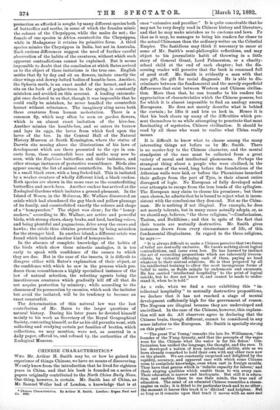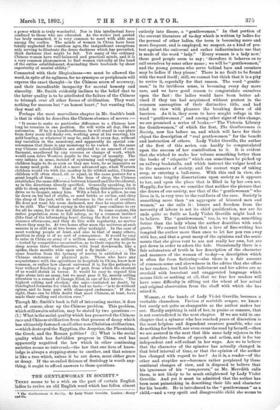CHINESE CHARACTERISTIC S.* WHO Mr. Arthur H. Smith may be,
or how he gained his experience of things Chinese, we have no means of discovering. We only know from the introduction that he lived for eighteen years in China, and that his book is founded on a series of papers originally contributed to the North China Daily News. One thing, however, is certain. Mr. Smith has of China, as Mr. Samuel Weller had of London, a knowledge that is at
• Chinese Characteristics. By Arthur H. Smith. London : Been Paul and Co. 1892.
once "extensive and peculiar." It is quite conceivable that he may not be very deeply read in Chinese history and literature, and that he may make mistakes as to customs and laws. Pe that as it may, he manages to bring his readers far closer to the actual Chinaman than the ordinary writer on the Celestial Empire. The fastidious may think it necessary to sneer at some of Mr. Smith's semi-philosophic reflections, and may object to his journalistic habit of throwing in a little story of General Grant, Lord Palmerston, or a charity-
school child at the end of each chapter; but the dis- cerning reader will perceive that the book is crammed full of good stuff. Mr. Smith is evidently a man with that rare gift, the gift for racial diagnosis. He is able to dis- criminate between the fundamental and the merely superficial differences that exist between Western and Chinese civilisa- tion. More than that, he can transfer to his readers the appreciation of characteristics which the Chinese possess, but for which it is almost impossible to find an analogy among Europeans. He does not merely describe what is behind the curtain ; he lifts it and lets us look in. Hence it is that his book clears up many of the difficulties which pre- sent themselves to us while attempting to penetrate that most fascinating of mysteries, Chinese civilisation. It should be read by all those who want to realise what China really means.
It is difficult to know what to choose among the many interesting things set before us by Mr. Smith. There is no master-key to the Chinese character, and the mental standpoint of the race must be collected from a great variety of moral and intellectual phenomena. Perhaps the strangest thing about a people who were civilised, in the truest sense of the word, long before the foundations of the Athenian walls were laid, or before the Phcenicians launched their galleys from the port of Tyre, is their almost entire
disregard of logic. No European of fully developed mind ever attempts to escape from the iron bonds of the syllogism. The European may claim to choose his premisses ; but these once chosen, he admits that he is bound to reject what is incon-
sistent with the conclusions they demand. Not so the China- man He is nothing if not illogical. For example, he does not merely tolerate, but in many cases actually adopts, or, as we should say, believes, "the three religions,"—Confucianism, Taoism, and Buddhism ; and this in spite of the fact that their tenets are mutually destructive. Mr. Smith gives instances drawn from every circumstance of life, of this fundamental illogicalness. In regard to the three religions, he says :—
" It is always difficult to make a Chinese perceive that two forms of belief are mutually exclusive. He knows nothing about logical contradictions, and cares even less. He has learned by instinct the art of reconciling propositions which are inherently irrecon- cilable, by violently affirming each of them, paying no heed whatever to their mutual relations. He is thus prepared by all his intellectual training to allow the most incongruous forms of belief to unite, as fluids mingle by endosmosis and exosmosis. He has carried intellectual hospitality' to the point of logical suicide, but he does not know it, and cannot be made to under- stand it, when he is told."
As a rule, when we find a race exhibiting this "in- tellectual hospitality" to mutually destructive propositions,
we declare that it has not reached a stage of mental development sufficiently high for the government of reason.
The Negroes are illogical because they are undeveloped and uncivilised. In the case of the Chinese, however, this explana- tion will not do. All observers agree in declaring that the Chinese brain, though different, cannot be considered in any sense inferior to the European. Mr. Smith is specially strong on this point
" The great 'Pal Tsung,' remarks the late Dr. Williamson, the founder of the rang dynasty, said that the precepts of the sages were for the, Chinese what the water is for the fishes.' Con- fucianism has unified the language, the thought, and the race. It has developed a nation of keen intellectual ability, able as we have already remarked to hold their own with any other race now on the planet. We are constantly surprised and delighted by the rapidity, accuracy, and apparent ease with which some Chinese seem to Essimilate knowledge, even when cast in foreign moulds. They have that genius which is infinite capacity for labour,' and those staying qualities which enable them to win every race. Their education is narrow and inadequate. But still it is educa- tion, and enables them to use their minds, the true end of education. The mind of an educated Chinese resembles a steam- engine on rails ; it is fitted to its particular track and to no other ; the moment it leaves this track it is ditched' and helpless. But as long as it remains upon that track it moves with an ease and a power which is truly wonderful. Nor is this intellectual force confined to those who are educated. Is the writer just quoted has truly remarked, it is very common to meet with able men among the coolies. The minds of women in China have been totally neglected for countless ages, the insignificant exceptions only serving to illustrate the dense darkness which has prevailed, thick darkness that might be felt. Yet many of the ordinary Chinese women have well-balanced and practical minds, and it is a very common phenomenon to find women virtually at the head of the entire establishment, dominating their husbands by sheer superiority of mental ability."
Connected with their illogicalness—we must be allowed the word, in spite of its ugliness, for no synonym or periphrasis will express the exact thought—is the Chinese scorn of accuracy, and their ineradicable incapacity for mental honesty and sincerity. Mr. Smith evidently inclines to the belief that to the latter quality is to be attributed the failure of the Chinese to triumph over all other forms of civilisation. They want nothing for success but "an honest heart ;" but wanting that, they want all.
Perhaps the most marvellous chapter in Mr. Smith's book is that in which he describes the Chinese absence of nerves :— " It seems to make no particular difference to a Chinese how long he remains in one position. He will write all day, like an automaton. If he is a handicraftsman, he will stand in one place from dewy morn till dusky eve, working away at his weaving, his gold-beating, or whatever it may be, and do it every day, without any variation in the monotony, and apparently no special con- sciousness that there is any monotony to be varied. In the same way Chinese school-children are subjected to an amount of con- finement, unrelieved by any recesses or change of work, which would soon drive Western pupils to the verge of insanity. The very infants in arms, instead of squirming and wriggling as our children begin to do as soon as they are born, lie as impassive as so many mud gods. And at a more advanced age, when Western children would vie with the monkey in its wildest antics, Chinese children will often stand, sit or squat, in the same posture for a great length of time In the item of sleep, the Chinese establishes the same difference between himself and the Occidental, as in the directions already specified. Generally speaking, he is able to sleep anywhere. None of the trifling disturbances which drive us to despair, annoy him. With a brick for a pillow, he can lie down on his bed of stalks, or mud bricks or rattan, and sleep the sleep of the just, with no reference to the rest of creation. He does not want his room darkened, nor does he require others to be still. The infant crying in the night' may continue to cry for all he cares, for it does not disturb him. In some regions, the entire population seem to fall asleep, as by a common instinct (like that of the hibernating bear) during the first two hours of summer afternoons, and they do this with regularity, no matter where they may be. At two hours after noon the universe at such seasons is as still as at two hours after midnight. In the case of most working people at least, and also in that of many others, position in sleep is of no sort of consequence. It would be easy to raise in China an army of a million men—nay, of ten millions —tested by competitive examination, as to their capacity to go to sleep across three wheelbarrows, with head downwards, like a spider, their mouths wide open and a fly inside ! . . . . . . The same freedom from the tyranny of nerves is exhibited in the Chinese endurance of physical pain. Those who have any acquaintance with the operations in hospitals in China, know how common, or rather how almost universal it is, for the patients to bear without flinching a degree of pain from which the stoutest of us would shrink in terror. It would be easy to expand this topic alone into an essay, but we must pass it by, merely calling attention to a remark of George Eliot, in one of her letters. The highest calling and election,' she says—irritated no doubt, by theological formulas for which she had no taste= is to do without opium, and to bear pain with clear-eyed endurance.' If she is right, there can be little doubt that most Chinese, at least, have made their calling and election sure.'
Though Mr. Smith's book is full of interesting matter, it does not, of course, clear up the Chinese problem. This problem, which still awaits solution, may be stated by two questions :- (1.) What is the social quality which has preserved the Chinese race and Chinese civilisation from that process of decay which has ultimately fastened on all other non-Christian civilisations, —which destroyed the Egyptian, the Assyrian, the Phcenician, the Greek, and the Roman polities? (2.) What is the social quality which has forbidden progress in China, and has apparently negatived the law which in other continuing societies seems so universal,—the law that one item of know- ledge is always a stepping-stone to another, and that science is like a tree which, unless it be cut down, must either grow or decay. If the so-called Science of Sociology is worth any- thing, it ought to afford answers to these questions.



































 Previous page
Previous page